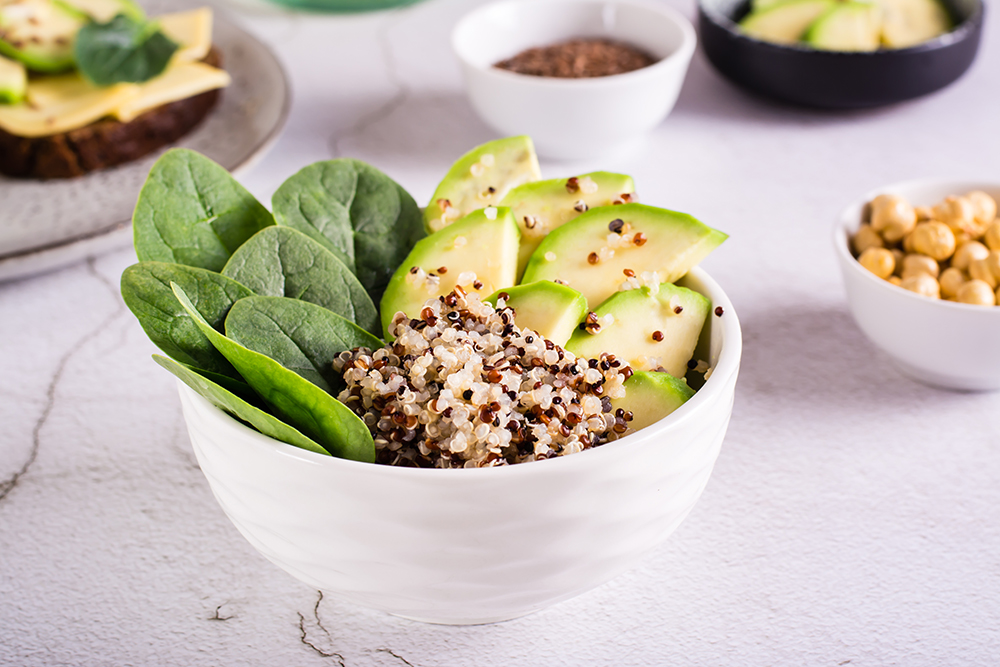Losing weight can be a challenge, but it’s not impossible. Many people struggle with dieting and keeping the weight off, but there is a solution: organic foods.
An organic diet focuses on eating whole, unprocessed foods naturally low in calories. This type of diet is beneficial for both your physical and mental health.
This blog post will discuss the benefits of organic diets for weight loss and provide tips for following one yourself!
What Are Organic Foods?
You may have heard the term “organic” thrown around in the produce section or at your local farmer’s market, but what does it really mean?
For a food to be labeled “organic,” it must be produced without synthetic pesticides and fertilizers.
Organic meat, poultry, eggs, and dairy products come from animals that are not given antibiotics or growth hormones. Organic food is often fresher and grown locally, supporting small farmers and reducing the environmental impact of transport.
Additionally, organic produce such as fruits and vegetables tends to have higher levels of nutrients like antioxidants, which can benefit overall health.
This is because organic farmers prioritize soil health and rotate their crops, leading to better nutrient absorption in the plants. Eating organic foods means avoiding harmful chemicals and toxins that can adversely affect the body.
Why eat organic, natural foods to lose weight?
A healthy diet is crucial for successful weight loss; organic foods can help with that.
Organic foods are a great option if you want to shed some pounds. Here are some of the benefits of an organic diet plan for weight loss:
1. Lessens Food Cravings and Addiction
Organic production means that foods are not genetically modified or treated with synthetic hormones and chemicals, leading to sugar cravings and addictive eating habits.
Eliminating these additives can help reduce cravings for sugary and processed foods, making it easier to stick to a healthy weight loss plan.
Additionally, when we eat conventional produce, we consume pesticide residue that can disrupt our hormones and lead to overeating. An organic diet helps eliminate this issue.
2. Increases Satiety and Reduces Calorie Intake

Weight gain is often linked to overconsumption of calories, and organic foods can help with this.
Organic produce tends to have higher levels of fiber, which helps you feel fuller longer and leads to consuming fewer calories throughout the day. It also contains more beneficial nutrients that keep your body satiated and nourished.
Since genetically modified organisms (GMOs) are not allowed in organic production, organic foods do not contain added preservatives and fillers that can contribute to weight gain.
3. Improved Energy Levels
Conventional foods can be filled with preservatives and chemicals that can cause inflammation in the body and lead to low energy levels.
The health benefits of organic foods, including higher nutrient levels and the absence of harmful additives, can improve energy and overall well-being.
Sugar crashes and fatigue can be eliminated with organic foods that provide sustained energy and nourishment.
4. Lower Insulin Levels

Organic foods are naturally lower in sugar and processed carbohydrates, improving insulin levels.
The glycemic index of organic foods is often lower, meaning they have a slower and more stable effect on blood sugar. This can benefit those with diabetes or pre-diabetes and prevent weight gain and related health issues.
Diet foods labeled “low-fat” or “sugar-free” often contain artificial sweeteners and chemicals that can increase insulin levels and contribute to weight gain.
Choosing organic foods, especially organic produce and lean proteins, can help keep insulin levels stable for successful weight loss and good metabolic health.
5. Improved Digestion
Eating organic foods can improve digestion, improving nutrient absorption, and overall health. This can also aid in weight loss by reducing bloating and discomfort from digestive issues.
To help you lose weight, organic foods can provide better digestion by avoiding additives such as artificial fillers and preservatives that can cause discomfort and inflammation. They also do not contain GMOs, which have been linked to digestive problems.
How To Incorporate The Best Organic Foods Into Your Diet
Incorporating organic foods into your weight loss plan can have numerous benefits, but how do you start eating organic?
Here are some tips that will help you jumpstart your organic diet for weight loss:
Look at Food Labels
Organic food labels will typically have “USDA organic” on them, while conventional foods and non-organic produce may contain additives or GMOs.
When shopping for organic produce, focus on the items with the highest levels of pesticide residue when conventionally grown (referred to as the “Dirty Dozen”). These include strawberries, spinach, and apples.
You can also look for organic meats and dairy products, as well as organic packaged foods that do not contain artificial ingredients or preservatives.
Shop Local
Shopping at a farmer’s market or joining a local CSA (community-supported agriculture) can provide access to organic produce grown by smaller farms.
Not only does this support local agriculture and the environment, but it can also often be more affordable and provide fresher, tastier produce.
Grow Your Food

Growing organic fruits and vegetables in your garden or backyard is rewarding and allow you to control the production process and access fresh organic produce whenever you need it.
Easy organic gardening methods can even be successful in small spaces, such as container gardening or vertical gardens.
Balance Your Meals
Eating organic does not mean depriving yourself or cutting out entire food groups.
Instead, balance organic lean proteins and produce healthy fats and whole grains to have a well-rounded diet for weight loss and optimal health.
For convenience, you can also search for organic versions of your favorite foods, such as organic snacks or frozen organic meals.
Start Slow

Eating organic foods for weight loss can be a significant change, so start slowly and gradually incorporating organic options into your diet.
Make small swaps like choosing organic produce or organic lean proteins or replacing conventional packaged snacks with organic versions.
As you become more familiar with organic options and see the benefits, you can continue to add in more organic choices for long-term success and improved health.
Final Thoughts
Losing excess weight and improving your health can be challenging, but organic foods can support weight loss efforts in numerous ways.
From balancing insulin levels to improved digestion, organic foods can provide numerous benefits for successful weight loss and overall wellness.
Start incorporating organic options into your diet with these tips, and you may see the difference in your weight and how you feel.
Do you incorporate organic foods into your weight loss plan? Have you noticed any benefits from eating organic? Share your experiences with us in the comments below.






Leave A Comment